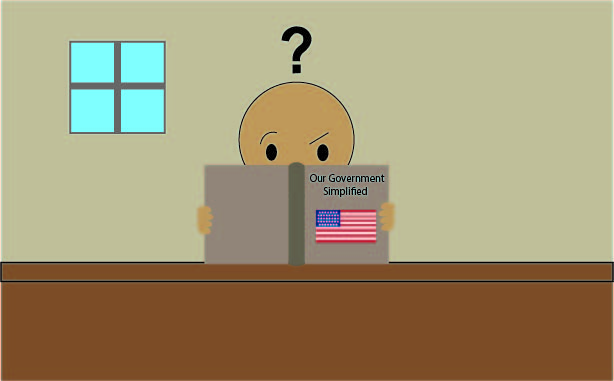The Civic Illiteracy Issue in America
February 14, 2022
Think to yourself, what kind of things do you know about our government and politics in general? Maybe you know who our president is, the branches of the government, what a bill is, or the basic rights of a US citizen. These things might seem simple, but so many Americans are not aware of them or their importance. Civics is the study of the rights and duties of citizenship, and what citizens can do. Many people are illiterate when it comes to civics, meaning they are not aware of their rights and duties, or how their government is run. Whether the American school system is failing to teach students the right things, or Americans do not care enough about their own government, is a big debate that needs to be talked about.
In the United States of America, we have a democracy. This means that the government has to listen to what citizens have to say in terms of voting and legislation. Although not all citizens are represented fairly in government, but that is a topic for another time. Forbes states that “we expect immigrants to this country to pass the USCIS test in order to become citizens. Yet four out of five native-born Americans under 45 cannot fulfill this minimal condition.” This really helps show how uneducated Americans can be about the government. Our democracy is super important because it lets citizens share their opinions and ideas for what we think our country needs in order to succeed, but if people are lacking knowledge of our government, they will not know what it needs or how they can make a change. So, they either become a bystander or misuse their voice in government. Sophomore Aiden Chien agrees with this, saying that “some people don’t feel the need to get involved in government or they do not care enough about what is going on.”
Explaining why our democracy is important, junior Isaak Aligab states, “This is where we live, so it is important to know about policies being passed for example, and who we are voting for and why.”
People that lack knowledge of our government are easily coerced by mass media, society, and specific political parties to swing a certain way. Knowing your personal rights helps you form an opinion based on the current government and what it needs, rather than only believing what other people say. For example, the National Civic League says, “This combination of civic illiteracy alongside the proliferation of unvetted ‘news sources’ helps to explain why we’ve seen an increase in the number of individuals believing conspiracy theories about the election and the Coronavirus.” People might also be civically illiterate due to being influenced by family members, and hearing fake news or certain opinions in their own home. Freshman Sara Cizek thinks that one way to avoid this is by “not listening to obvious fake news, and looking for the right information about government and politics.” Searching for the most trustworthy sources is definitely a good tip when learning about civics and the government.
Being civically literate as a whole population is something our country should be striving towards daily. It is way overlooked, and not focused on enough in day to day life at school. Medium states that “research shows that civic literacy among students buffers against polarizing trends and promotes inclusivity.” Being civically literate has so many benefits, not only for the success of our democracy, but with our education, relationships, and ability to understand others. Being an active and informed citizen means understanding political and legal systems, exploring the nature of citizenship and diversity in society. Additionally, Education says that “being able to read, view, write, speak about and listen to a variety of texts will enable students to access new information and become more informed and articulate citizens.” Citizens should not rely only on school to teach them how to be literate. It can be just as easy to find trustworthy sources outside of school to further an understanding on civics and how our government works. This being said, the school system in America does have some room for improvement. History classes in schools teach so much about the history of the U.S. and the whole world, which is super important, but it is not until the 12th grade that we take a Civics class that teaches us about current problems in the U.S. and all about our government. Senior Keira Hanson says that “it is hard that we only learn about this stuff when we are almost out of high school.” Some might argue that it takes a certain level of maturity to learn about the current government and the U.S. as a country, but I disagree. I believe schools should teach us current governmental content earlier in highschool as well. This civic illiteracy issue can be helped, if more people would care about our government and the well being of our country.



